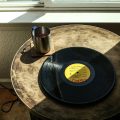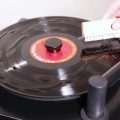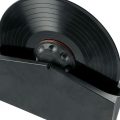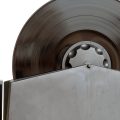If you’re a vinyl enthusiast, you know the heartbreak of discovering a smoke-damaged record all too well. It’s a common problem that can turn even the most promising album into an unlistenable mess, with a persistent odor that seems impossible to eliminate.
But don’t despair! As a longtime collector and self-proclaimed vinyl whisperer, I’ve picked up a few tricks over the years for banishing that stubborn smoke smell and restoring your records to their former glory.
So grab a cup of coffee, put on your favorite tunes, and let’s get ready to tackle that smoke smell head-on. Your vinyl collection will thank you!

Table of Contents
- Understanding the Smoke Smell
- DIY Solutions for Removing Smoke Smell
- Preventive Measures
- Banish the Scent of Smoke!
- FAQs
Picture this: you’re at your local thrift store, flipping through stacks of vinyl records, when suddenly you stumble upon a rare gem. It’s an album you’ve been searching for for years, and the price is unbelievably low. You snatch it up, barely able to contain your excitement as you rush home to give it a spin.
But as soon as you slide the record out of its sleeve, your heart sinks. That unmistakable smell of stale cigarette smoke wafts up to your nostrils, and you realize your precious find has been tainted by years of exposure to a smoky environment.
Understanding the Smoke Smell
Vinyl albums are like sponges when it comes to absorbing smells, especially the stubborn odor of smoke. Whether it’s from cigarettes, cigars, or even a house fire, smoke particles can cling to the surface of your records, leaving behind a stale, unpleasant scent that can be tough to eliminate.
The Science Behind Smoke Particles and Vinyl Interaction
So, what’s the deal with smoke and vinyl? Well, it all comes down to the tiny particles that make up smoke. These microscopic bits of ash, tar, and other substances are released into the air when something burns, and they have a knack for sticking to surfaces – including your beloved vinyl records.
You see, vinyl is made up of a type of plastic called polyvinyl chloride (PVC), which has a slightly porous surface. This means that it’s full of tiny little nooks and crannies where smoke particles can settle in and make themselves at home. Over time, these particles build up, leaving behind a lingering smoke smell that can be a real challenge to get rid of.
Protecting Your Records from Smoke Damage
But don’t worry, there are plenty of ways to combat smoke damage on your vinyl albums. The key is to act fast and be thorough in your cleaning efforts. The longer you let that smoky smell linger, the harder it’ll be to eliminate.
One important thing to keep in mind is that smoke can do more than just leave a funky smell on your records – it can actually cause physical damage too. The acids and chemicals in smoke can eat away at the vinyl material over time, leading to surface noise, skips, and even permanent damage.
So, if you’re a smoker or live with someone who is, it’s crucial to keep your records stored in a smoke-free environment as much as possible. Consider investing in some protective sleeves or cases to help shield your albums from smoke particles and other airborne contaminants.
DIY Solutions for Removing Smoke Smell
Alright, let’s roll up our sleeves and get to work on banishing that pesky smoke smell from your vinyl collection! There are plenty of simple, effective DIY methods you can try at home using common household items. Here’s a step-by-step guide to help you freshen up those records in no time.
Baking Soda: Your Secret Weapon
First up, let’s talk about baking soda. This pantry staple is a natural odor absorber, making it a great choice for tackling smoke smells on vinyl. Here’s what you’ll need to do:
- Find a large, sealable container that’s big enough to hold your record.
- Pour a generous amount of baking soda into the bottom of the container, creating a layer about half an inch deep.
- Place your record vertically in the container, making sure it’s not touching the baking soda.
- Seal the container tightly and let it sit for 24-48 hours.
- After the waiting period, remove your record and gently brush off any baking soda that may have clung to the surface.
- Give your record a spin and enjoy the fresh, smoke-free sound!
- Ideal for Baking: Made with fine baking soda particles from Grade 1 baking soda to create fluffier recipes; Elevate your baking and enjoy great results with ARM & HAMMER Baking Soda
- Made in USA: Pure baking soda made in Green River, Wyoming that’s ready for baking; Manufactured with a focus on using locally sourced ingredients, renewable electricity, and water from the Green River Basin
- Pure & Natural: Free of harsh chemicals, gluten free, kosher, and can be used in organic baking; ARM & HAMMER is America’s #1 trusted baking soda brand
- 100+ Uses: Hundreds of other uses around your home including cleaning, health and beauty, deodorizing, crafting, and more; Your go-to, multipurpose solution for cleaning and deodorizing around your home
- The ARM & HAMMER Promise: We take care of the planet and create products you know and trust; ARM & HAMMER Baking Soda is certified carbon neutral by measuring our carbon footprint and reducing it to zero through internal reductions and offsets
Prices pulled from the Amazon Product Advertising API on:
Product prices and availability are accurate as of the date/time indicated and are subject to change. Any price and availability information displayed on [relevant Amazon Site(s), as applicable] at the time of purchase will apply to the purchase of this product.
Activated Charcoal: A Powerful Odor Absorber
Another natural odor remover that works wonders on smoke-damaged vinyl is activated charcoal. This porous substance is known for its ability to trap and neutralize odors, making it a popular choice for air purification. Here’s how to use it:
- Find a container that’s large enough to hold your record and has a tight-fitting lid.
- Place a handful of activated charcoal pellets or sachets in the bottom of the container.
- Set your record vertically in the container, making sure it’s not touching the charcoal.
- Close the lid tightly and let the charcoal work its magic for 24-48 hours.
- After the waiting period, remove your record and give it a quick wipe with a clean, dry cloth to remove any dust.
- Play your record and marvel at the smoke-free sound quality!
- Ideal for detoxification & cleansing
- Rejuvenates your skin
- Free of artificial color, flavor, sulfates, phthalates, dioxides, stearates.
- Manufactured in GMP facility
- 100% Satisfaction guarantee
Prices pulled from the Amazon Product Advertising API on:
Product prices and availability are accurate as of the date/time indicated and are subject to change. Any price and availability information displayed on [relevant Amazon Site(s), as applicable] at the time of purchase will apply to the purchase of this product.
Combining Methods for Maximum Effectiveness
If you’re dealing with a particularly stubborn smoke smell, you might want to try combining these DIY methods for an extra-powerful cleaning punch. For example, you could create a layer of baking soda and activated charcoal in the same container, placing your record vertically between the two.
You could also try placing your record in a sealed container with baking soda or activated charcoal, then setting that container outside in direct sunlight for a few hours. The heat from the sun can help speed up the odor absorption process, giving you faster results.
Remember, the key to success with these DIY methods is patience. The longer you let your record sit with the odor-absorbing substance, the better the results will be. And if you’re dealing with a large collection of smoke-damaged vinyl, don’t be afraid to repeat the process multiple times until you achieve the fresh, clean sound you’re after.
Preventive Measures
Now that we’ve covered how to get rid of that nasty smoke smell from your vinyl records, let’s talk about how to prevent it from happening in the first place. After all, an ounce of prevention is worth a pound of cure, right? Here are some simple strategies you can use to keep your albums smelling fresh and smoke-free.
Create a Smoke-Free Listening Environment
The first step in protecting your vinyl from smoke damage is to create a dedicated listening space that’s completely smoke-free. This means no smoking anywhere near your record player, speakers, or album storage area. If you or someone in your household smokes, make sure they do it outside or in a separate room with good ventilation.
You might also want to invest in an air purifier to help remove any lingering smoke particles from the air. Look for one with a HEPA filter, which is designed to trap even the tiniest particles, including smoke. Place the purifier near your listening area and let it run continuously to keep the air clean and fresh.
Proper Album Storage is Key
How you store your vinyl albums can make a big difference in their ability to resist smoke damage. Ideally, you want to keep your records in a cool, dry place away from direct sunlight and heat sources. This helps prevent warping and other physical damage that can make your albums more susceptible to absorbing odors.
Consider investing in some high-quality record sleeves or jackets to provide an extra layer of protection against smoke and other contaminants. Look for sleeves made from materials like polypropylene or polyethylene, which are naturally resistant to dust, dirt, and moisture.
If you’re really serious about preserving your vinyl collection, you might even want to consider storing your albums in a sealed container or cabinet when they’re not in use. This can help protect them from smoke, dust, and other airborne particles that can settle on the surface of your records over time.
Handle with Care
Another important aspect of preventing smoke damage to your vinyl is proper handling. Every time you touch your records, you’re leaving behind oils and other residues from your skin that can attract dust and smoke particles. To minimize this, always handle your albums by the edges and the label area, avoiding touching the surface of the record itself as much as possible.
When you do need to clean your records, use a soft, lint-free cloth or a specialized vinyl cleaning brush. Avoid using any harsh chemicals or abrasive materials that could damage the delicate surface of your albums. If you’re unsure about how to properly clean your records, consult with a professional or do some research online to find the best method for your specific needs.
Make Smoke-Free Living a Priority
At the end of the day, the best way to prevent smoke damage to your vinyl collection is to make smoke-free living a priority. If you’re a smoker, consider quitting or at least cutting back on how much you smoke indoors. If you live with a smoker, have an honest conversation about the importance of protecting your shared living space from smoke damage.
Remember, it’s not just your vinyl collection that can suffer from exposure to smoke – your health and the health of those around you can be impacted too. By making a commitment to smoke-free living, you’re not only protecting your precious albums, but you’re also investing in a healthier, happier future for yourself and your loved ones.
Banish the Scent of Smoke!
Before we wrap things up, let’s take a moment to appreciate the bigger picture. As vinyl enthusiasts, we’re not just collectors – we’re caretakers. These albums are more than just pieces of plastic; they’re tangible pieces of music history, each with its own story to tell. By taking the time to properly clean, store, and protect our records, we’re ensuring that those stories can be enjoyed by generations to come.
So the next time you come across a smoke-damaged album, don’t despair. Remember the tips and techniques we’ve covered in this article, and approach the problem with confidence and care. With a little patience and some elbow grease, you can restore even the smokiest record to its former glory.
And who knows? Maybe one day, years from now, someone will stumble upon one of your lovingly restored albums in a thrift store bin. They’ll slide it out of its sleeve, take a deep breath, and marvel at the pristine condition and fresh, smoke-free scent. And in that moment, they’ll silently thank the anonymous vinyl lover who took the time to preserve this piece of musical history for future generations to enjoy.
So keep spinning those records, my friend. Keep hunting for those elusive gems, and keep fighting the good fight against smoke damage. Your vinyl collection – and the music lovers of tomorrow – will thank you for it.
FAQs
Can I use regular cleaning products to remove smoke smell from my vinyl records?
It’s best to avoid using harsh chemicals or cleaning products that aren’t specifically designed for use on vinyl. Many household cleaners contain ingredients that can damage the delicate surface of your records, leading to even more problems down the line. Stick to the DIY solutions we’ve outlined in this article, or invest in a specialized vinyl cleaning solution from a trusted brand.
How long does it typically take to remove smoke smell from a record?
It can vary depending on the severity of the odor and the method you’re using. In general, you can expect the process to take anywhere from 24-48 hours, although some particularly stubborn odors may require multiple treatments. Be patient and persistent, and you’ll eventually see (and smell) the results you’re after.
Can smoke damage affect the sound quality of my vinyl records?
Unfortunately, yes. In addition to leaving behind an unpleasant odor, smoke can also cause physical damage to your vinyl albums over time. The acids and chemicals in smoke can eat away at the delicate grooves of your records, leading to surface noise, skips, and other audio issues. That’s why it’s so important to address smoke damage as soon as possible, and to take steps to prevent it from happening in the first place.
Is it safe to play a smoke-damaged record on my turntable?
It’s generally safe to play a smoke-damaged record on your turntable, as long as the odor isn’t accompanied by visible signs of physical damage like warping, scratches, or mold. However, keep in mind that the smoke particles clinging to your record can transfer to your turntable’s stylus and other components, potentially causing long-term damage. If possible, it’s best to give your record a thorough cleaning before playing it to minimize this risk.
Can I use these same techniques to remove other types of odors from my vinyl albums?
Yes! The DIY solutions and preventive measures we’ve covered in this article can be effective for removing all sorts of odors from your vinyl collection, not just smoke. Whether you’re dealing with musty basement smell, pet odors, or any other unpleasant scent, the key is to act quickly and be consistent in your cleaning efforts. With a little patience and persistence, you can restore your albums to their original, odor-free state.
What should I do if I can’t seem to remove the smoke smell from my record no matter what I try?
If you’ve tried all the methods outlined in this article and you’re still dealing with a persistent smoke odor, it may be time to consult with a professional. Look for a reputable record cleaning service in your area, or reach out to a vinyl restoration expert for guidance. In some cases, deeply ingrained odors may require specialized equipment and techniques to fully remove. Don’t be afraid to ask for help if you’re feeling stuck – your vinyl collection is worth it!







